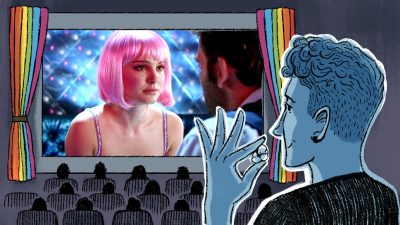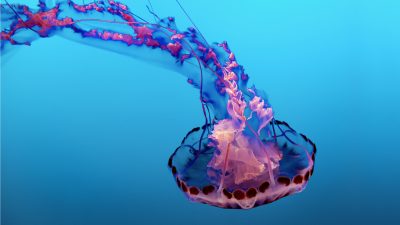Columns Backyard Politics
Learning How to Be Gentle in the Face of Trauma—Others’ and My Own
Bees do not attack—just as trauma survivors do not attack, but rather defend. She will not sting you unless she believes the colony’s life depends on her defense. Because when she stings you, she dies.
This is Backyard Politics, a column by Christine Hyung-Oak Lee that sees the world through the lens of urban farming and agriculture.
1.
Bears eat honey. Recent studies show that bears might even prefer the protein of bee bodies. Regardless of whether they’re trying to eat entrée or dessert, bears will destroy a hive to eat what’s inside.
It is best not to look anything like a bear when near a beehive.
Do not wear a fur coat near a beehive. Do not move erratically near a beehive. Definitely do not move erratically if you also happen to sport a beard. Resembling a bear near a hive will provoke a colony to defend itself.
Every piece of protocol having to do with opening a hive for inspection is about not appearing like a bear. We beekeepers move slowly and smoothly—think tai chi—when opening up a hive and picking up frames to inspect.
We move slowww. We move smoooooth. We flowwwwww.
We do not “thump” the hive like an invading bear would. We do not rattle frames like a hungry, inquisitive bear.
We move slowww. We move smoooooth. We flowwwwww. Un-bear-like.
Our bee suits are white. They are white by design, so that we do not look like bears (the polar variety lives nowhere near a beehive). You will likely never see a black or dark brown bee suit. Also, beekeeping season usually takes place in the warmer months; you would be brave for more than one reason if you were to sport a dark bee suit under the sun.
As all beekeepers do, I’ve had my share of stings.
I once wore a pair of wool socks to do a hive inspection. I pried open the inner cover of the hive and set it down. As I lifted the first frame out of the hive, I felt a sting. And then another. And another.
I looked down. There were at least twenty bees on my pink and gray Lucky Brand socks. I was puzzled, but also in pain. Getting stung is always annoying. Also it really does hurt.
By the time I slowwwly, smoooothly placed the frame back in the hive, backed away from the hive, and brushed the bees off my socks, I had nine stings on both my ankles. They’d stung me through my socks. Later, I learned that wool likely reminded the bees of bears. So, do not remind bees of sheep, either.
My feet wouldn’t smush into any other footwear for a week. Thank goodness for Birkenstocks (standard issue for a Berkeleyan). I’ll never wear wool socks while inspecting bees ever again. Because bear.
This isn’t to give bears a bad rap. They’re creatures in the world just as we all are. But in the world of bees, bears are bad news. Bees hate bears.
Bees have been around since the dawn of flowers 120 million years ago. Bears, in turn, have been around for 30 million years. So bees have hated bears for 30 million fucking years. Bees, they seem to say, “We got here first.”
This isn’t to say a bee has explicit memory. Bees live for six weeks in the summertime (sometimes living up to six months in the wintertime). So it’s not like there’s a grudge match between a single bee and a single bear.
Via pheromones and movement, each bee communicates things like state of alarm, health of hive, and location of food. In doing so, the bee adds to colony memory. Bottom line: Bees evolved to hate bears. Because again: Bears have fucked with bees for 30 million fucking years.
Bees are the motherfucking borg. They are individuals. But they are part of one collective. Each bee contributes to the memory of the hive. Everything, too, is done for the good of the collective.
And the collective trauma of bees makes it so they never forget the threat of bears. Even if the colony in front of you has never seen a bear in its life. For a bee, trauma is implicit.
2.
Trauma never really leaves a body, does it?
What we experience in our childhood will inform our future experiences. What sadness and pain we experience then will make it so we’re always wary. Our past experiences inform our future experiences.
And like bees, there’s opportunity for evolution in our response to trauma, too.
When I had a stroke a number of years ago, my brain went offline. I was left with a fifteen-minute short-term memory. I lost executive function and was unable to make decisions—not even off a restaurant menu. For nearly a year, if I went to a restaurant, I ordered the hamburger. Did you know that nearly every restaurant offers hamburgers? I do.
I also had to intuit things. I couldn’t explain how to get from point A to point B. But if I stopped envisioning a map, I could drive there following my gut. (Jeebus, I can’t believe I drove.) My coping skills were also offline. I wasn’t able to self-talk or reassure myself. I melted down at the slightest challenge. Like a toddler.
And like a toddler, I clawed. I fought. I stung like a bee. I gave no shits about how I defended myself and whether I hurt people, because all I wanted to do was defend my zone of safety. Make myself heard. Let my emotions out.
Your body has a memory that goes deeper than anything.
My family is full of war survivors, and all those lessons informed my recovery. I was on high alert. I had to make it back. I couldn’t live the way I’d been living. I became depressed. But determined to recover. I was Team No Chill. My main methodology for recovery was to battle everything. I was rock. I was metal. I was an axe.
Then I became a new mother and a divorcee.
While I’d taken lessons and trauma from my childhood to become Team No Chill in stroke recovery, I took lessons from stroke recovery and became Team Zen as I moved into life as a divorcee. I was just really fucking sad. My friends wanted me to be really fucking angry. To fight as I had so many times before in my life. But I needed to be really fucking sad. I didn’t need to be angry. I needed to feel. I was water. I was a waterfall.
Trauma never really leaves a body, does it? Trauma changes. It evolves. It never leaves. But a response to trauma can be changed and is varied.
You can try to will trauma to leave. You can try to numb it away. You can try and drink it away. You can try to push it away by getting high. You can absorb it. You can squeeze lessons out of it. You can accept that it has happened.
Trauma is unique. Two people can have nearly the same experiences, and it will manifest in different ways.
A close family member is in recovery. Their experience in childhood, very similar to mine and filled with verbal abuse paired with strict demands, manifested in addiction. Their recovery now informs our family’s collective memory. It has prompted us to re-examine our lives and the ways in which we have interacted with each other. It has made us evolve and reassess our communication and support. It has shaken our family. It has made our family, made it stronger.
My family member—the one in recovery—is making their pain known. Is communicating to the hive a location previously unknown. Is sending out an alarm.
One of my hives was inordinately gentle. I named it East Egg. It was hardly ever irritated. It was the good child. Just as my family member was as a child: mellow and complacent.
But one morning, I found it in a state of extreme agitation. Even at nine o’clock in the morning, the bees looked angry. I was befuddled. And visited it again over the next two weeks at different times of the day. Every time, guard bees from East Egg would fly up at me. Right at my head, bumping me in warning.
I hadn’t even provoked them. I was not wearing wool. I was not wearing fur. I did not have a beard. I was slowww. Smooooth. Even then, they were making sure to carve a wide swath of safe space around the hive.
I called my mentor, Jennifer. She told me to take a picture of the hive.
There it was, she said. Skunk paw marks on the side of the hive. A novice at the time, I hadn’t noticed.
Jennifer said, “Take a picture of the ground in front of the hive.” And there they were—wads of bee bodies.
Skunks, another well known predator of bees, had been eating the bees in the nighttime. They like to sit and tap on the hive like they’re playing blackjack and eat bees as they fly out to defend. Actually, they don’t so much eat them as they chew on them like gum, get all the juice out of the body, then spit out the shells. They will return, night after night, after having discovered a beehive.
East Egg was on high alert and sensitive to disturbance. The alarm pheromone had been released. They were stressed. They were defensive. Sometimes, being defensive will get you killed.
So of course that hive was irritated. We devised a solution: a nail board to deter skunks. I put up a baby monitor next to the hive and watched it on occasion in the nighttime. And eventually, the skunk stopped visiting so much. Then, it stopped visiting at all.
But East Egg was never the same again after that. It was gentle, but never as gentle before the skunks.
If you experience a trauma, it will turn on all your alarms, the alarms from your ancestors and the ancestors before them. Like a hive attacked by a skunk, you will be on high alert, with higher sensitivity and reaction to disturbance.
3.
Bees are defensive creatures. They do not attack—just as trauma survivors do not attack, but rather defend. Yes, I know it’s a matter of perspective. They sure do look like they’re attacking. But an unprovoked hive will not.
A bee will not sting you unless she believes the colony’s life depends on her defense. Because when a honeybee stings you, she dies.
When my family member told me they were in recovery, everything made sense, because it was finally the truth. And it has made me confront my own narrative. I’ve gone to therapy on and off for over twenty-five years. So much so that I call my therapist Uncle Karl. I examined my demons, examined my behaviors, and built a life-long toolkit for crisis. But in what ways was I also a contributing factor to someone else’s crisis? In what ways was I a bear?
I asked my family member about all the times I’d tried not to make them angry, but had still enraged them. How I might have hurt them. And how I could best support them, go forward.
They said, “Yeah. That was me having gotten high the night before. I wasn’t high anymore, so I got angry.”
A bee will not sting you unless she believes the colony’s life depends on her defense. Because when a honeybee stings you, she dies. For fifteen years, I’d tried hard to only discuss the weather or other banal topics with them. And kept conversations to shorter than five minutes in length. All to avoid fighting. And yet, I still triggered them.
I remember asking them years ago after a rising conflict, “Seriously. When was the last time I was an asshole to you? Please try to remember.”
“I can’t remember,” they said.
“I haven’t said anything mean to you in fifteen years,” I said. “So why are you so mad?”
Remember East Egg? This is the nature of trauma. Of a traumatized person defending themselves, even if the attack is only perceived.
In many ways, I reminded them of danger, purely because I’m related by blood and by family and by circumstance and by narrative to deep psychic wounds. I am not the actual bear. But I resemble the bear in my diction, my anecdotes, the people we have in common, all the things that take them back to childhood and pain.
Or, in other ways, they were themselves lit with alarm—and already on high alert—and there was nothing I could have done.
Honeybees have an alarm pheromone that some say smells like bananas. As the bee lays dying after a sting, she emits an alarm pheromone, alerting other bees to the source of danger, like a location-tracking device. This then signals the other bees to defend and sting on behalf of the hive.
For as long as the alarm pheromone hangs in the air, the hive will continue to be agitated. For as long as the hive is reminded of an attack, the hive will remain on guard. For as long as the hive is on guard, the hive will more readily sting, which will cause the hive to emit more alarm pheromone.
If only our own sense of alarm smelled like bananas.
Also, do not eat bananas near a hive or before hive inspection.
4.
I have some confessions to make. These are the things of which I’m wary: Racists. Young white men who drive pickup trucks. MAGA hats. Walking in the nighttime. Salmon. Stiletto heels. Stick-shift trucks. Eyebrow waxing. Midori melon liqueur. Single-malt scotch. Handcuffs.
Each of these objects has a story that belies the reason I’ve included them on a list of things that cause me distress. Salmon, because it gave me food poisoning and I’ve never been able to eat cooked salmon since. Eyebrow waxing, because it has never gone well for me, ever.
Each of these things has made me feel unsafe or extremely uncomfortable. Made me feel my life or identity or body was at stake. These are not narratives that were told to me. But they are borne out of my own experiences. My own fear.
At one point, I went to talk to Uncle Karl and asked him why I still love beekeeping, even if the bees sting me. How is it that the stings don’t traumatize me as they do other people?
Trauma, said Uncle Karl, can be outweighed by joy, by the loveliness of an outcome.
I guess this is also why women historically give birth to more than one child in a lifetime. And why the human race hasn’t gone extinct. I guess this is why marathon runners exist. Or why people play football. Or why people suffer through the abuse of a kitchen from dishwasher to commis to chef de cuisine. Or why some really masochistic people become writers.
I guess, also, that not every bad thing that happens to us has to stay with us forever. That joy can outweigh injury. And I wonder if joy can transform a bad experience into a positive one.
Bees have been here since the dawn of flowers. They evolved to support pollination. They have survived one hundred twenty million years, all while withstanding bears for one quarter of that time.
They have been in existence for longer than humans.
I am learning how not to be a bear.
Maybe it’s because my brain changed. Maybe it’s greater empathy for struggle and challenge. Maybe age has subdued me. Maybe beekeeping has pervaded my life. This is a valid case. Maybe I’m just tired as shit. Whatever the cause, I have become slower and gentler over the course of the last ten years.
I am learning how to be gentle. To see people behind their triggers. To be joyful. To spread joy. To support my family member in recovery. But not interfere.
Because we are all survivors. And we deserve to be survivors.







